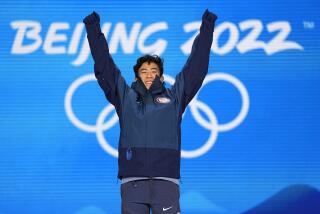China deports 8 American demonstrators
Eight Americans jailed for holding peaceful protests were deported Sunday during the Olympics closing ceremony, the U.S. Embassy said.
The action came just hours after the embassy urged their release and expressed disappointment that the Games had not brought greater tolerance and openness to China.
A British and a German protester were also released from detention, the Associated Press reported, citing British and German diplomats and American activists.
During the early stages of the 17-day Olympics, China was content to question and quickly deport foreign protesters. But in recent days, with most of the 100 or so foreign heads of state who attended the opening ceremony gone, the regime had taken a harder line, adding lockup time.
Most of those detained were stopped by police while mounting small-scale protests over Chinese policies on Tibet and human rights, including those just deported.
Phelim Kine, a Hong Kong-based researcher with Human Rights Watch, said China’s switch to a more punitive approach before backing down under pressure suggested that it felt emboldened by the international community’s apparent acquiescence to its methods.
China has received high marks for its stadiums and detailed preparation for the Games. The marked difference between the way China and most Olympic hosts view peaceful protests, however, was seen in Beijing’s failure to approve a single protest at three designated zones set up in local parks.
China, which keeps a tight lid on any domestic complaints, was almost certainly pressured to set up the zones by the International Olympic Committee.
IOC President Jacques Rogge said at a news conference Sunday that the Games had helped open up China, although he expressed surprise that Chinese officials hadn’t approved a single protest.
Human rights groups and relatives said some of the Chinese who applied were arrested. State media said most of those who turned in the 77 protest applications saw their complaints addressed, obviating the need to grant permits. The claim could not be confirmed, and some international rights groups have called the zones a “sham.”
Separately, Eddie Perez Romero, the La Puente pastor who painted Bible verses and anti-Beijing slogans on the walls of upscale hotel rooms just before the Games opened, was detained Sunday after shouting protests in Tiananmen Square, according to Tony Thomas, his spokesman in La Puente. His whereabouts are unknown, Thomas added.
Romero has been demanding that Beijing free five political and religious prisoners and sign a U.N. human rights accord.
Under Chinese law, detainees can be held for up to 14 days for minor offenses.
The IOC has also come under criticism for failing to ensure Beijing lived up to its commitments on foreign media freedom and unfettered Internet access as a condition for winning the rights to host the Olympics.
The U.S. Embassy met with the eight detained Americans on Friday, it said in a statement, adding that the following day Ambassador Clark Randt pressed the Chinese government for their release. The detainees said they had not been mistreated, the embassy added.
The U.S. Embassy said that the eight released Americans -- James Powderly, Brian Conley, Jeffrey Rae, Jeff Goldin, Michael Liss, Tom Grant, Jeremy Wells and John Watterberg -- were deported aboard a China Air flight Sunday evening to Los Angeles.
China has become more aware of its human rights shortcomings in recent years and has taken some tepid steps to improve the behavior of officials. Police are in theory required to film interrogations, for instance, in a bid to stem the use of torture to extract confessions.
But the Communist Party sits atop a society with major problems related to corruption and injustice, and China’s leaders remain fearful that even small protests could spread and jeopardize their power.
Months of foreign protests over Tibet and Darfur have put many Chinese on the defensive, leading some to suggest the West has sought to block China’s rise and sabotage the Games.
Senior Chinese leaders rated the Games a great success.
“The Beijing Olympic Games are a testimony to the fact that the world has its trust rested upon China,” said Liu Qi, president of the Beijing Olympic committee.
--
greg.johnson@latimes.com
Magnier reported from Beijing and Johnson from Los Angeles.
More to Read
Go beyond the scoreboard
Get the latest on L.A.'s teams in the daily Sports Report newsletter.
You may occasionally receive promotional content from the Los Angeles Times.





